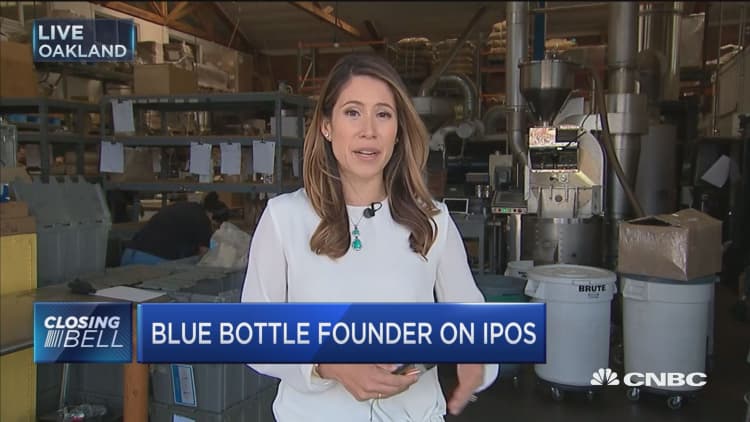
Nestle has acquired a majority stake in premium coffee company Blue Bottle Coffee.
Nestle, a Swiss company, already owns coffee brands Nespresso and Nescafe, but it has had a limited impact on the U.S. coffee market.
Nestle CEO Mark Schneider took over this year. He has expressed interest in growing the company's coffee business and expanding its North American footprint. The Blue Bottle acquisition will do both.
"This is a really interesting move on the part of Nestle," Matthew Barry, a beverage analyst at Euromonitor International, said in an email.
"While in the past rivals like JAB Holdings and Lavazza have been aggressive in adding new brands, Nestle has preferred to keep the focus on its current coffee brands like Nespresso," Barry wrote. "It's not surprising that they would make an exception here though, because this premium coffee space has a lot of potential."
Blue Bottle CEO Bryan Meehan said he met Schneider in February at one of Blue Bottle's Brooklyn coffee shops. Schneider respects what Blue Bottle does as a company, Meehan said.
Nestle is an expert in coffee for in-home consumption, Meehan said. Blue Bottle is driving innovation in the specialty coffee market and is primarily focused on retail, two areas where Nestle has a growing interest, he said.
"And we were interested in working with someone who would let us get on with what we're good at doing," Meehan said.
That sold him.
Nestle now owns 68 percent of Blue Bottle, Meehan said. The company will replace the only two current nonemployee board members. Blue Bottle will still hold two board seats. More seats may be added, Meehan said.
Blue Bottle opened its first coffee shop in Oakland, California, 15 years ago. Many of its shops are in the Bay Area, but it has expanded to cities such as New York and Tokyo. It is expected to have 55 stores open by the end of the year, up from 29 at the end of last year, according to Nestle's press release.
Silicon Valley has helped the coffee chain grow. Blue Bottle raised $120.7 million in funding over three rounds, according to Crunchbase.
Morgan Stanley, Twitter co-founder Ev Williams, and GV, the venture capital arm of Google's parent company, Alphabet, are among those who have invested, according to Crunchbase.
Mike Volpi, a partner at Index Ventures, has sat on Blue Bottle's board since 2012 and will be replaced by a Nestle employee. He said the deal is great for both Blue Bottle and Nestle.
"For Blue Bottle, it's sort of recognition of the brand and the product they've created over the last four to five years and the incredibly tasteful approach they've taken to a new category of specialty coffee. It's terrific for them," Volpi said.
"For Nestle, it's a big win in that it gives them access to the U.S. market where they haven't had a big presence in retail coffee," he added. "It's a chance to take Blue Bottle to a much bigger scale given the financial resources Nestle has."
Blue Bottle sells two ready-to-drink coffee products: cold brew and New Orleans iced coffee. Nestle has the knowledge and resources to help grow them, Volpi said.
The ready-to-drink coffee market has been growing. It is a $2.9 billion dollar market but is projected to reach $4.4 billion by 2021, according to Euromonitor.
Starbucks has been the biggest player in the category, but other challengers have arisen. Earlier this month, McDonald's announced it would team up with Coca-Cola to launch a line of ready-to-drink products. Dunkin' Brands entered into a similar agreement with Coca-Cola this year.
If Nestle can harness Blue Bottle's ready-to-drink potential, it could prove to be a bigger opportunity than retail, said Ryan Caldbeck, founder and CEO of CircleUp, an investment platform for early-stage consumer start-ups.
The move underlines Nestle's focus on investing in high-growth categories and acting on consumer trends, Schneider, the Nestle CEO, said in a statement.
"Blue Bottle Coffee's passion for quality coffee and mission-based outlook make for a highly successful brand," Schneider said. "Their path to scale is clearly defined and benefits from increasing consumer appreciation for delicious and sustainable coffee."
Blue Bottle will continue to function as its own entity, Nestle said. Current management and employees will retain a minority stake. Meehan and founder and Chief Product Officer James Freeman will retain their roles.
Meehan said he understands some customers will be concerned Blue Bottle is partnering with a colossal food company. Meehan said fans can trust he and Freeman are not going anywhere.
"The reassurance I'm giving to customers is the Blue Bottle they know and love, the only way it's going to change is in ways that make Blue Bottle better," he said. "And I'm happy to be held accountable for that."
This could be only the beginning of larger consumer product companies buying so-called third-wave coffee companies, said Caldbeck, the CircleUp CEO. Brands like Starbucks are considered second-wave. Brands like Blue Bottle are classified as third-wave because they're made with higher-quality fresher beans that are roasted locally, thus are considered more artisanal — and are most expensive, he said.
Brands such as Philz Coffee and La Colombe will get bought, Caldbeck said. He said he can't predict when it will happen, but when it does he won't be surprised.


